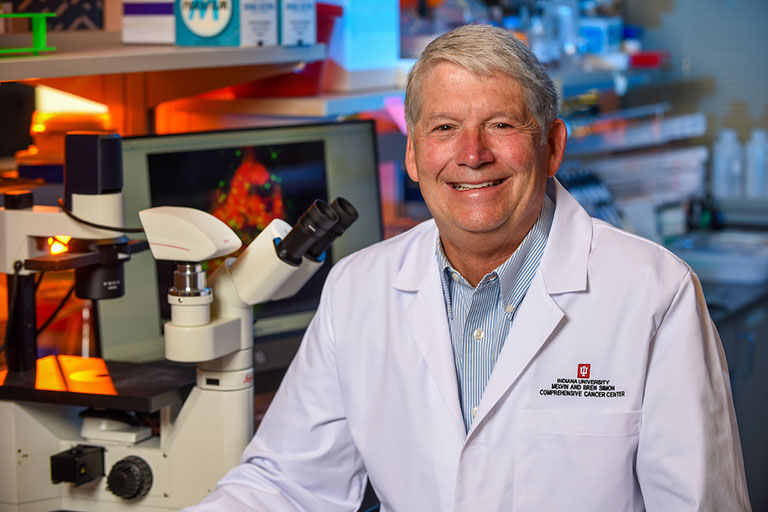
Chafiq Hamdouchi, PhD, chhamd@iu.edu
Co-Leader, Cancer Drug Discovery and Development Accelerator Program
Senior Research Professor, Department of Pathology & Laboratory Medicine, IU School of Medicine
Adjunct Professor, Department of Clinical Pharmacology, IU School of Medicine

Mark R. Kelley, PhD, mkelley@iu.edu
Co-Leader, Cancer Drug Discovery and Development Accelerator Program
Associate Director of Basic Science Research, IU Simon Comprehensive Cancer Center
Betty and Earl Herr Professor in Pediatric Oncology Research, IU School of Medicine

Crystal Baker, crybanks@iu.edu
CD3A Translational Research Coordinator & Project Manager, IU Simon Comprehensive Cancer Center

Katie Jackson, ksodrel@iu.edu
Administrative Operations Coordinator
Team Science: Kelvin Lee, MD
Targeting PIM2 and its Regulation of the c‐Myc Oncogene in Multiple Myeloma and Other Cancers
Multiple myeloma (MM) is a malignancy of plasma cells that is the second most common hematologic malignancy (20% of all cases) and remains incurable for almost all patients. The primary cause of treatment failure is upregulation of pro‐survival resistance mechanisms. Identifying these mechanisms remains key for any new therapeutic development.

Dr. Lee, et al. have shown that the serine‐threonine kinase PIM2 has a major prosurvival role in MM, and that their first‐in‐class PIM2‐selective, non‐ATP‐competitive allosteric inhibitors demonstrated significant MM cell death in vitro and were efficacious in preclinical in vivo xenograft models of MM. Their findings suggest a completely novel mechanism where their drug candidates disrupt a PIM2 interaction with a partner protein, resulting in downregulation of c‐Myc expression and loss of c‐Myc driven PIM2 gene expression.
The team is currently in the Lead Optimization phase, conducting advanced characterization of their drug candidates with the aim of identifying and developing potent, selective, and orally bioavailable PIM2 modulators whose preclinical efficacy, safety, and pharmacokinetic profiles will enable clinical exploration of efficacy and safety in patients with multiple myeloma and other cancers.
Team Science: Elliot Androphy, MD
Targeting HPV-16 E6 Protein
Cervical cancer is one of the leading world causes of cancer morbidity and mortality in woman, with more than 98% related to a human papillomavirus (HPV) infection origin.

Over the past four years, with support of grants from Indiana University Health, the Indiana Drug Discovery Alliance, IU Simon Comprehensive Cancer Center and the National Cancer Institute/NIH, Elliot Androphy, MD, (Dermatology) collaborated on a project to develop small molecules that inhibit the HPV-16 E6 protein by combining structure based drug design, medicinal chemistry, and development of new biochemical and cellular assays. Inhibition of this viral protein stops HPV replication and induces death of HPV-expressing cells. After multiple iterations of design and testing, their novel compounds show significant anti-tumor activity in xenotransplantation experiments. Such a breakthrough provides a unique opportunity for the treatment of women with cervical HPV infections including cancer in situ, all populations with anal and genital HPV-16 infections, and cancers of the oropharynx, cervix, anal canal, and genitalia due to HPV-16. HPV induced cancers cause 4.5% of all malignancies worldwide and lead to the death of > 600,000 people annually.
Dr. Androphy, along with Dr. Zhijian Lu, are co-founders of Kovina Therapeutics Inc.
Team Science: Mark Kelley, PhD
Nearly three decades of dedication by Mark Kelley, PhD, led to the development of APX3330, a molecular compound that targets a protein important to the development of several types of cancer.
In 2009, Dr. Kelley translated this discovery into a start-up company called Apexian Pharmaceuticals.

In the last 30 years, Kelley has disclosed 61 inventions, been awarded 19 patents and licensed three of his innovative technologies to other companies.
Targeting the APE1/Ref-1 protein with second generation inhibitors
Dr. Kelley and his collaborators, are targeting the APE1/Ref-1 redox signaling and DNA repair protein for a variety of cancers including pancreatic, sarcoma, colon and other solid tumors. AP endonuclease-1/Redox factor-1 (APE1/Ref-1 or Ref-1) is a multifunctional protein that is overexpressed in most aggressive cancers and impacts various cancer cell signaling pathways. Ref-1’s redox activity plays a significant role in activating transcription factors (TFs) such as NFκB, HIF1α, STAT3 and AP-1, which are crucial contributors to the development of tumors and metastatic growth. The development of potent, selective inhibitors to target Ref-1 redox function is an appealing approach for therapeutic intervention. A first-generation compound, APX3330 successfully completed phase I clinical trial in adults with progressing solid tumors with favorable response rate, pharmacokinetics (PK), and minimal toxicity. These positive results have prompted the team to develop more potent analogs of APX3330 to effectively target Ref-1 in a variety of cancers. A number of the new compounds are in the Lead Optimization phase.
More About Dr. Kelley's Research












